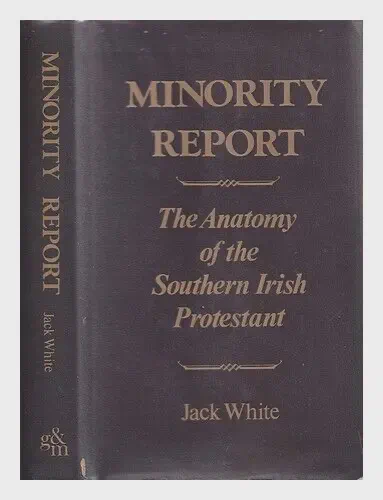
White, William John (‘Jack’) (1920–80), broadcaster, editor, journalist, and novelist, was born 30 March 1920 in Cork, second child of William Luke White, accountant, and Mary White (née Tyler).
In his book Minority report (1975) he described himself as ‘a member of a minority within a minority; we were Congregationalists in Cork’.
Jack White’s “Minority Report: The Protestant Community in the Irish Republic,” published in 1975, is a significant exploration of the status and experiences of the Protestant minority living in the predominantly Catholic Irish Republic. This work provides a nuanced examination of the social, political, and economic challenges faced by Protestants in the Republic of Ireland, offering insights into the complexities of Irish identity, religious diversity, and community relations within the state.
The book’s title, “Minority Report,” aptly reflects its focus on a segment of the population that, while historically influential, has been numerically smaller and, at times, marginalized in the socio-political landscape of the Irish Republic. Jack White, by delving into the experiences of the Protestant community, contributes to the broader discourse on minority rights, religious freedom, and the ongoing process of nation-building in Ireland.
Given the historical context, White’s work emerges at a time when Ireland was experiencing significant changes, not only in its economy and societal norms but also in its approach to addressing historical divisions and fostering a more inclusive national identity. The 1970s were a period marked by the Troubles in Northern Ireland, a conflict that, while geographically centered in the North, had profound implications for the entire island, influencing inter-community relations and perceptions across the border in the Republic.
“Minority Report: The Protestant Community in the Irish Republic” serves as an important document for understanding the nuances of Irish society during a pivotal era. It offers a perspective that is critical for comprehending the diversity of experiences within Ireland, shedding light on the importance of acknowledging and engaging with minority voices in the process of nation-building and reconciliation. Jack White’s work is a valuable resource for historians, sociologists, and anyone interested in the complex tapestry of Irish identity and inter-communal dynamics.